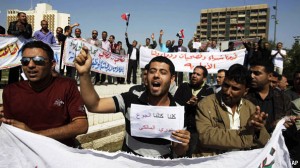Still recovering from its own bloody sectarian strife, Iraq has been rattled by events in Bahrain, where a mainly Shia protest movement has been quelled by the island kingdom’s ruling Sunni minority, backed by forces from Saudi Arabia and several other Gulf states. After the Saudi troops moved into Manama, Bahrain’s capital, in mid-March, Iraqi members of parliament fired off a string of angry speeches.
Politicians from Iraq’s Shia majority, including a former prime minister, Ibrahim al-Jaafari, castigated the Saudi intervention. Some Sunni, Kurdish and Christian members of Iraq’s parliament also condemned the Saudis, but the speaker, Osama el-Nujaifi, who hails from a leading Sunni family in Mosul, Iraq’s strongly Sunni city in the north, decided to close parliament down for ten days. Some Iraqi politicians, including Iyad Allawi, a Shia who leads the main Sunni block in parliament, said that a hiatus was required to stop sectarian tension boiling over in parliament.
But it is still bubbling. Politicians and religious leaders have continued to respond to events in Bahrain along sectarian lines. Muqtada al-Sadr, a populist Iraqi Shia cleric with a big following who leads his movement from a temporary home in Iran, has castigated the intervention too. Members of his political party have called for Bahrain’s embassy in Baghdad to be closed, whereas Haider al-Mulla, a Sunni MP, blames the uprising in Bahrain on Iranian interference and says that Iran’s embassy in Baghdad should be shut.
The prime minister, Nuri al-Maliki, a Shia who spent several years in exile in Iran, has also slammed Saudi Arabia, embarrassing his own ministry of foreign affairs by disparaging so powerful a neighbour ahead of a summit of the Arab League planned for May. Far from curbing his language, Mr Maliki later went on to say that the Saudi intervention in Bahrain could lead to a sectarian war in the region.
The authorities in Bahrain have since suspended flights to Iraq, as well as to Iran and Lebanon, where Hizbullah, the Shia party-cum-militia which underpins Lebanon’s current coalition government, has praised Bahrain’s protesters. Hassan Nasrallah, Hizbullah’s leader, enraged Bahrain’s ruling al-Khalifa family by likening it to Libya’s Qaddafis. This, said Bahrain’s foreign minister, Khalid al-Khalifa, was tantamount to a “terrorist threat”. Hizbullah, he claimed, was training Bahrain’s opposition; the leader of one of Bahrain’s more radical opposition movements, al-Haq, had stopped off in Beirut to meet Hizbullah people on his way back from exile in London to Bahrain. Newspapers in the Gulf say the authorities in Bahrain and the United Arab Emirates have deported several hundred Lebanese Shia expatriates.
Iraq’s parliament has now reopened but the row has weakened a coalition government that is in any case built on a fragile ethno-sectarian power-sharing agreement. More than a year after elections, no defence or interior minister has been appointed. Iran, it is said, has been promoting its own candidate for the interior ministry, whereas the defence ministry was promised to Mr Allawi’s Sunni-backed block. But Mr Maliki has rejected several of Mr Allawi’s nominees. Although the prime minister has a firm grip on the security services and has been trying to expand his own executive powers, he is looking more isolated as erstwhile allies complain that he has broken the promises he made when he was putting his ruling coalition together.
Mr Sadr has sought to capitalise on Mr Maliki’s weakness by making himself look less sectarian, for instance by holding press conferences alongside Mr Allawi. The Sadrists have also declared themselves in favour of a freer press and have sounded sympathetic towards protesters on the street. If relations with Mr Maliki worsen, the Sadrists may throw their weight wholeheartedly behind the protesters, who have so far been mainly secular. But some of them say they would work with Mr Sadr’s anti-Western religious movement if that would help their cause.




































April 30th, 2011 at 9:24 am
Peace be on you
but i says it very clear that todays problems on Muslim people due to Yahudes and Nasarae have hand .
And these all are the planing of West
which is i always says that west is not helping us but they increas these problem not they come to solve.
the Ahle e KEDAB PRODUCT =0
THEIR RELIGION=0
I hope one day we will unit and ……Ensha Allah